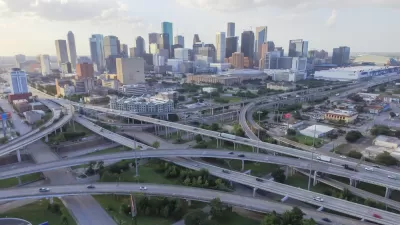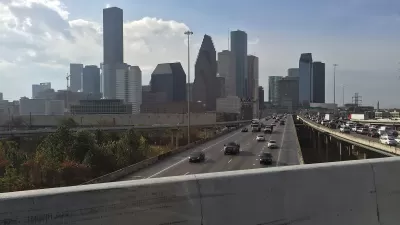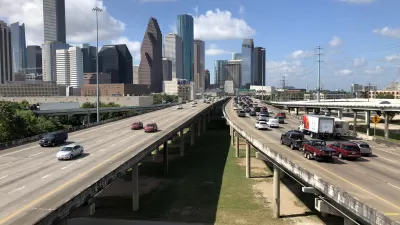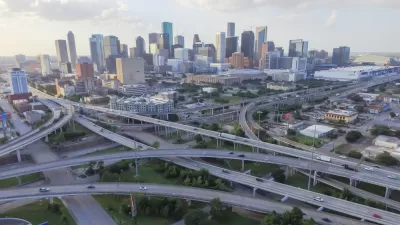“There’s no train, there’s no bus, there’s no anything that supports mass transportation. It doesn’t exist.” -Houston resident Fabian Ramirez.

“Texas, with its wide-laned roads and supersized highways, seems like an unlikely place for a rebellion against the supremacy of American car culture.”
So begins a feature-length Guardian article by Oliver Milman that flips the script about Texas as a potential location for a freeway rebellion. According to Milman, “last week a band of residents from across Texas descended upon the state’s department of transportation (DoT) to voice fury over new highway expansions that are set to displace thousands of people and raze hundreds of businesses, schools and churches.”
At the center of the growing rebellion are plans to expand Interstate 45 in Houston, a project known officially as the North Houston Highway Improvement Project, which we at Planetizen have been documenting since 2015.
According to Milman, however, the I-45 widening plan is only one sign of a growing resistance to car-centric planning in the state of Texas. The resistance is being led by local governments, the status quo of automobile dependency, by the Texas Department of Transportation (TxDOT).
“San Antonio planned to narrow a two-mile stretch of Broadway Avenue, a key thoroughfare, and add protected bike lanes, only for Texas DoT to overrule the city in January to halt it, citing fears over worsened traffic congestion, reports Milman for one example. For more, Milman writes: “Beyond the highway expansion in Houston, Texas is upsizing major roadways that carve through Austin and El Paso, as well as eliminating the planned bike lanes and pedestrian crossings in San Antonio.”
Like in the recent example provided by Republican legislators in Wisconsin, Milman suggests that the state funding made available by the federal Infrastructure Investment and Jobs Act is fueling the car-centric fire. “While some states, such as California, have started to recognize studies that show if you sow more asphalt you simply reap more traffic, Texas is pushing ahead with an unprecedented blitz of new road space for cars.”
“In Texas, the mandate for the supremacy of roads comes via the state constitution, which requires that highways are funded to the exclusion of almost anything else that moves people around. About 97% of the $30bn a year the state gives its transportation department is spent on highways, leaving very little for buses, trains or bicycles,” adds Milman.
The resistance is saying the concrete has finally gone to far—displacing low-income and communities of color, killing too many pedestrians and drivers, and creating too many greenhouse gas emissions and public health-impacting air pollution.
How is it that a grassroots rebellion has risen up against the Goliath status quo of car-centric planning in the state of Texas? Click through at the link below for a lot more detail.
FULL STORY: ‘It’s just more and more lanes’: the Texan revolt against giant new highways

Planetizen Federal Action Tracker
A weekly monitor of how Trump’s orders and actions are impacting planners and planning in America.

Restaurant Patios Were a Pandemic Win — Why Were They so Hard to Keep?
Social distancing requirements and changes in travel patterns prompted cities to pilot new uses for street and sidewalk space. Then it got complicated.

Map: Where Senate Republicans Want to Sell Your Public Lands
For public land advocates, the Senate Republicans’ proposal to sell millions of acres of public land in the West is “the biggest fight of their careers.”

Maui's Vacation Rental Debate Turns Ugly
Verbal attacks, misinformation campaigns and fistfights plague a high-stakes debate to convert thousands of vacation rentals into long-term housing.

San Francisco Suspends Traffic Calming Amidst Record Deaths
Citing “a challenging fiscal landscape,” the city will cease the program on the heels of 42 traffic deaths, including 24 pedestrians.

California Homeless Arrests, Citations Spike After Ruling
An investigation reveals that anti-homeless actions increased up to 500% after Grants Pass v. Johnson — even in cities claiming no policy change.
Urban Design for Planners 1: Software Tools
This six-course series explores essential urban design concepts using open source software and equips planners with the tools they need to participate fully in the urban design process.
Planning for Universal Design
Learn the tools for implementing Universal Design in planning regulations.
Heyer Gruel & Associates PA
JM Goldson LLC
Custer County Colorado
City of Camden Redevelopment Agency
City of Astoria
Transportation Research & Education Center (TREC) at Portland State University
Camden Redevelopment Agency
City of Claremont
Municipality of Princeton (NJ)





























